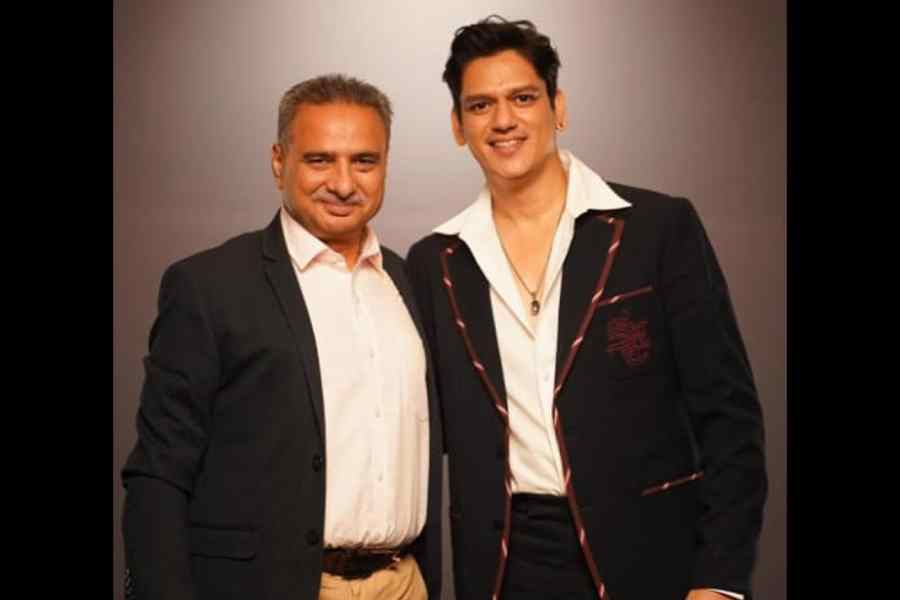A gun to his head, the pilot took off from Amritsar. The gunman still behind him, he flew so low above Lahore that airport authorities were forced to allow him to land after initially refusing permission.
The pilot was Captain Devi Sharan, Indian hero of the December 1999 hijack of a Kathmandu-New Delhi Indian Airlines flight, portrayed by the new Netflix series, IC 814: The Kandahar Hijack. Actor Vijay Varma stars as Sharan.
Almost 25 years since the hijack, Sharan, now 64 and still flying planes for Air India, told The Telegraph on Monday that he still regrets being unable to save a passenger who had his throat slit by the hijackers. He also remembered how his wife Navneet Kaur stood firm for the seven traumatic days of the hijack.
IC-814, the Indian Airlines Airbus A300 flying from Kathmandu with 176 passengers and 15 crew members, was hijacked on December 24, 1999, by five terrorists as it entered India’s airspace.
The plane was first taken to Amritsar, then Lahore, Dubai and finally Kandahar. After negotiations, India freed three terrorists — Masood Azhar, Omar Sheikh and Mushtaq Ahmed Zargar — and the passengers were released in exchange on December 31.
Veteran Air India officials recounted how they were called back to headquarters and stayed put there as the crisis unfolded, with a nation riveted to a horrifying cliffhanger.
Here are excerpts from a conversation Sharan had with this newspaper before Flight AI961, which he commandeered from New Delhi to Nairobi, took off on Monday afternoon.
Gun to the head
“Koi harqat nahin honi chahiye (There shouldn’t be any mischief). Go west,” this was the first thing the chief of the five hijackers, also referred to as the “Chief” in the Netflix series, told Sharan, putting a gun to his head.
“They wanted to go to Lahore or Kabul,” Sharan said. “For the entire first night, they had a gun to my head. After that, they would point the gun (only) when they asked me to do something.”
Daring decision
Asked which of his decisions he considered most crucial, Sharan said it was the way he had landed the plane in Lahore. The air traffic control (ATC) in Lahore had initially refused him permission to land. The runway lights had been switched off.
“I was flying the aircraft too low over Lahore city to crash-land and had kept the transponder switched on so that Lahore ATC could see how close we were to a disaster,” Sharan recounted.
“It was a gamble that paid off. The Lahore ATC got scared. We were about 40 seconds from crash-landing when the Lahore ATC told me they were allowing us to land and switched on the runway lights.”
He added: “We were running very low on fuel. Both the fuel reserve lights were on.”
Disappointment
Looking back to the night of December 24, 1999, Sharan’s biggest disappointment is his inability to keep the plane at Amritsar airport.
“The aircraft was there for 49 minutes. I hadexpected the plane to be stopped at Amritsar. But it did not happen,” he said. “I was forced to take off by the hijackers. They slit the throats of three passengers (one of whom died).”
The regret
His biggest regret is the death of one of the passengers whose throat was slit.
“If that passenger could have been saved, I would have been more happy. After all these years, I feel losing the passenger was a very sad thing,” he said.
“As commander of the flight, I feel the passengers, who pay for flying safely, should not be harmed at all.”
He added that all his crew members did their best in the crisis.
“The operations manual in those days clearly stated that all the instructions of the hijackers should be followed,” he said.
Mismatches
In the Netflix series, Vijay Varma as Sharan is shown fixing the plumbing lines of the aircraft at Kandahar airport after the toilets get clogged and give out an unbearable stench.
“I did not fix the plumbing lines myself. They (Taliban authorities) sent a worker. I took him down into the aircraft hold as he would not know where the lines were,” Sharan said.
Also, he said, foreign minister Jaswant Singh did not salute him as shown in the series.
“He made a gesture that showed appreciation of our efforts,” he said.
Life after hijack
Sharan did not fly for four months. But since then, he has flown regularly. “I have now been flying for 40 years,” he said.
Four to five passengers from the hijacked plane had stayed in touch with Sharan over the phone until about five years ago.
“A few passengers on some flights recognise me when my name is announced on board. After the Netflix series, I received so many calls from people,” he said.










